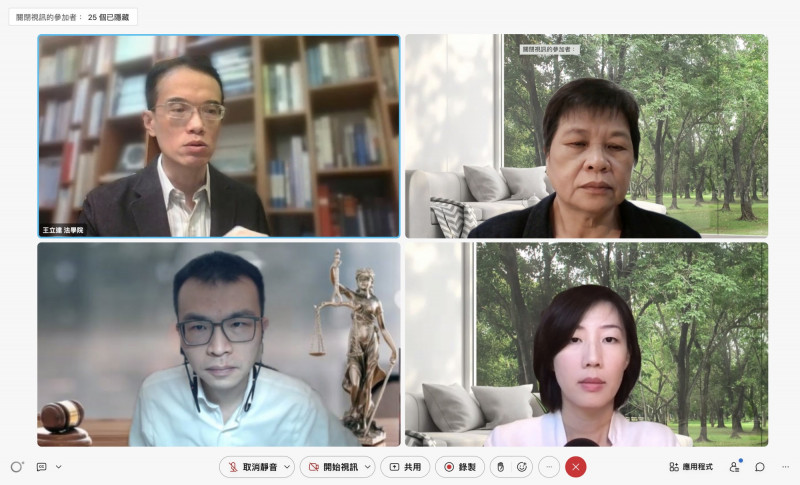Wang Lida, Distinguished Professor of the Law Department of National Chengchi University, Lin Zhaozhen, Professor of the Institute of Journalism, National Taiwan University, Chen Yanren, Associate Professor of the Patent Institute of National Taiwan University, and Xu Xiaofen, Associate Professor of the Law Department of Chenggong University, held an online press conference today.
(recapped from the screen of the press conference)
[Reporter Xu Ziling/Taipei Report] Taiwanese media and multinational digital platforms have completed the first round of negotiations but failed to reach a specific agreement. Domestic legal and journalism scholars jointly suggested today (20) that all media associations should immediately start in-depth cross-media communication and integrate the media In order to conduct more effective negotiations; the platform side must disclose relevant information about bargaining and inform the profit-sharing calculation mechanism, rather than asking for prices indiscriminately.
The Department of Digital Technology responded that the opinions of scholars have been collected one after another today, and they will be brought to the cross-ministerial group discussion simultaneously with the opinions of trade associations and industries.
Under the convening of the Ministry of Digital Development, the four major news media associations in China, including the Newspaper Association, Magazine Association, Television Association, and Satellite Television Association, have completed four face-to-face negotiations with multinational digital platforms Google and Meta (Facebook) in December. , but no consensus was reached. Scholars who have been following this issue for a long time will hold an online press conference today for in-depth discussions.
Please read on...
After sorting out the content of the four talks, scholars pointed out that domestic media organizations and platforms negotiated for the first time. Since they had no previous experience in talks, they expressed their respective positions. "It is difficult to have specific interactions." However, the talks still revealed a lot of information.
As far as Google and Meta are concerned, there are differences in the negotiating positions of the two major platforms.
Google made it clear that it is willing to protect and recognize the development of Taiwan's news industry, and proposed a "co-prosperity plan" to find an exclusive model belonging to Taiwan; Meta emphasized that it is an enterprise and must concentrate time and resources to develop short videos and other favorites. Content.
Meta also emphasized that it has invested 100 million US dollars to conduct various fact checks to ensure the trustworthiness of information on the platform.
As for the appeals put forward by the four major media associations, although they all hope that the government will intervene in legislation, there are also different approaches. Taxes”, among which the Magazine Association even proposed a “special fund” system, whereby third-party organizations redistribute tax donations to the media.
Scholars call on platforms to disclose reprint traffic and advertising revenue
How do scholars view the results of the first round of negotiations?
Wang Lida, Distinguished Professor of the Law Department of National Chengchi University, said that he was sure that Google had proposed a co-prosperity plan, and he also called on Meta to follow up. However, he believed that the first meeting was just "to ease the atmosphere" and did not actually touch on the bargaining price.
He lamented that after the meeting, he did not see the future agenda, nor did he confirm that the next price negotiation can be carried out. He called on the digital department to continue to supervise and integrate the demands of all parties.
Wang Lida made two major appeals to the platform side. The first is to send people with decision-making power to participate in the meeting and negotiation; It is important information in the negotiation process, but the media cannot get it, and the platform is urged to disclose relevant information.
Wang Lida emphasized, "Having a good meeting is a good start, but the key point is whether we will enter into the actual negotiation." In terms of digitization, fact checking, and media associations, there are some differences in appeals, and the positions need to be re-integrated and more consistent.
As for the "digital tax" proposed by the media, scholars are generally not optimistic about it. They even bluntly said that "digital tax is a more difficult path than negotiation and bargaining", and believe that Australia's bargaining model is more suitable for Taiwan's media industry.
Chen Yanren, an associate professor at the National Taiwan University of Science and Technology's Patent Institute, said that if Taiwan implements a digital tax on platforms, it is like transferring the property of one group of people to another group of people through legislation.
Grasp the pulse of the economy with one hand I subscribe to Free Finance Youtube channel
Already added friends, thank you
Welcome to 【Free Finance】
feel good
Already liked it, thank you.
related news
